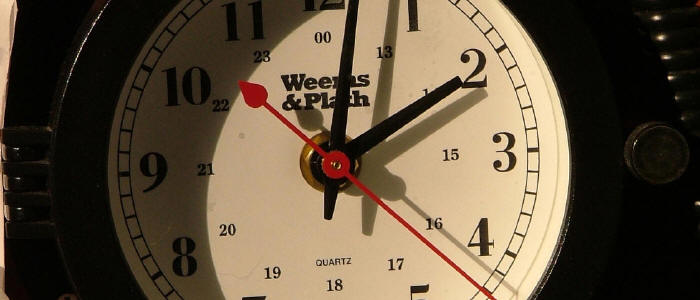
Originally posted on the blog in April 2007 at Isla Mujeres, Mexico
What time is it?
When you're traveling the world, do you have trouble keeping track of what time it is? If you're flying, the crew generally tells you the local time at your destination. For those of us traveling by sailboat, it's a little more complicated. A recent thread on the Yahoo! World-Cruising group about time coincided with our return to Mexico from Panamá and the western Caribbean islands. This and my mom's question, "What time is it there?" prompted this meander.
When you're at sea, it's whatever time those on board agree that it is. However, since communication with others is important, some standards are useful. Our standard is Coordinated Universal Time or UTC. This is also known as GMT or Zulu time, but GMT can be confusing because that's what the British and Irish call their time, but they use daylight savings time in the summer, and Zulu and UTC don't. So we just call it UTC and keep one clock and the ship's computer set to it. SSB radio schedules are usually given in UTC, and we report our position using it as well.
When we left San Diego at the end of October on the Baja Ha-Ha 2007, the daily question was "What time is it here?" Every day the answer was "the same time as when we left San Diego." When we left San Diego, it was still Pacific Daylight Time (PDT), but in Baja California (the Mexican state), it was Pacific Standard Time (PST) when we arrived at Cabo San Lucas. Across the Gulf of California in Mazatlán, it was Mountain Standard Time, which is actually the same as PDT, but by the time we got there, our family on the Pacific coast of the U.S. was back on PST, so there was still an hour's difference. In Puerto Vallarta we were late to happy hour because there was a time change between La Cruz where the boat was and PV, which is on Central time. We don't know if they use daylight savings because it was winter, so at least we avoided that complication. If this confuses you, then you know how we felt.
Time was easy for the rest of the winter (which they call summer in Central America even though it's north of the equator, but that's a different story). Central America is on Central time until you get to Panamá, which is on Eastern time. When we left Panamá at the end of March, we were on Eastern Standard Time (EST), which seems to have been the time in Isla Providencia and Grand Cayman too. At least, we met the agent in Providencia at the correct time, and the restaurant in Grand Cayman was still serving lunch when we got there. We stumbled across a cruising net on the SSB, though, an hour earlier than the time we had been told it was. Our fellow cruiser said it was Eastern time, but, oops, it's April now, and it must be Eastern Daylight Time (EDT). (That's why SSB radio information should always be given in UTC.)
But what time was it when we arrived at Isla Mujeres? One of our cruising guides said that Mexico and Belize don't observe daylight time, so when I talked with Mom as soon as we arrived here, I thought it was Central Standard Time (CST), which would only be an hour different from the PDT in Portland, Oregon, at this time of year. Based on this information, John and I had agreed to leave our watches and local time clocks as they were because we were going back to Eastern time soon. No need to change, we thought. Boy, were we confused. When I finally looked it up on World Clock, it turns out that most of Mexico observes daylight time, so the cruising guide was wrong, and it's Central Daylight Time (CDT) here. We don't have to change our local time clocks now, but we will need to do that when we go to Florida where it's EDT.
When it comes to time, it's only going to get worse. What will we use for local time as we cross the Atlantic? Someone on the World-Cruising group said that there are four time changes across the Atlantic. Looking at the map, I count five. And then someday when we get to India, we'll have half-hour time differences, something I discovered when we worked for a global company. It's a good thing the Internet is everywhere so we can be on time, whatever that is.
